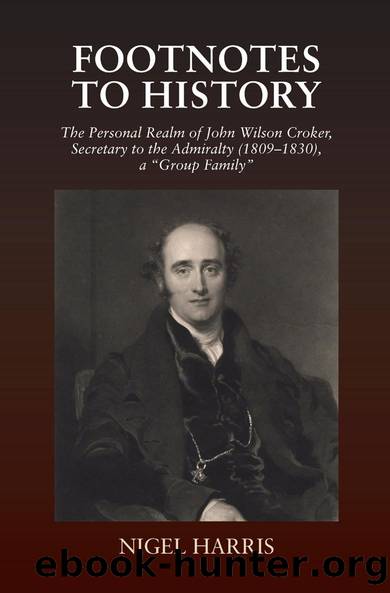Footnotes to History by Nigel Harris

Author:Nigel Harris [Harris, Nigel]
Language: eng
Format: epub
Tags: Biography & Autobiography, Historical, Military, Reference, Genealogy & Heraldry
ISBN: 9781845198305
Google: _zK5jwEACAAJ
Publisher: Sussex Academic Press
Published: 2016-08-15T00:39:32+00:00
OYSTER FISHERIES
By 1864, although still employed at the Admiralty, he had also become a director of two oyster fishery companies, the Exe Bight Oyster Fishery Company and the Herne Bay Oyster Fishery Company. In the case of the latter, despite being a public servant, he had lobbied in favour of a private Parliamentary bill which would have given the company exclusive rights over certain fishing grounds. When the bill was passed he was awarded a gratuity of £500 by the company and made its chairman. As it was to turn out, neither company was successful.10
In 1865 he had âunfortunately received a severe concussion from a fall with the Essex Staghounds, after one of the most brilliant runs of the seasonâ.11 This had rendered him âpermanently incapacitatedâ by âcerebral disturbancesâ which would have resulted in âvery serious consequencesâ had he resumed work. So he retired from his post in the Admiralty and was awarded a generous pension payment on grounds of incapacity. Despite this, after the Oyster and Mussel Fisheries Act was passed in 1866, he became actively involved in its implementation. Responsibility for implementing the Act was delegated to the Harbour Department of the Board of Trade, even though its officials were almost wholly ignorant of ostraculture. HC happened to be an acquaintance of the Boardâs secretary and through his recommendation was made an inspector of oyster fisheries on a temporary and unpaid basis. He carried out several inquiries under the Act but was paid only for his expenses. In 1868 he applied to have his post made permanent in order to receive a salary and to âadd to his years of superannuationâ.
The case for this had to be submitted by the president of the Board of Trade to the Treasury. The Treasury set up an inquiry team who strongly criticized his having promoted a private Parliamentary bill when he was still a civil servant. Worse, they concluded that not only had he given misleading figures to the Board of Trade about the loss of income he had suffered through taking up the post of inspector, but that given his obvious ability to carry out the associated duties there were âgrounds for believing that he procured his pension by improper meansâ. Nevertheless he seemed to be very good at his work and nobody else seemed better qualified to do it. His post was therefore placed on a permanent footing, with the proviso that he should repay the invalidity pension he had received from the Admiralty and relinquish the directorships of the two oyster companies.
He carried out his work with considerable enthusiasm and over the next six years held no fewer than twenty-one local inquiries into applications for exclusive rights to engage in oyster fishing over previously open-access fishing grounds. Oyster fishery on a commercial scale did not turn out to be a success and by 1874 he had lost his post as inspector of Oyster Fisheries in part through lack of work,12 but also because the post was combined with
Download
This site does not store any files on its server. We only index and link to content provided by other sites. Please contact the content providers to delete copyright contents if any and email us, we'll remove relevant links or contents immediately.
| France | Germany |
| Great Britain | Greece |
| Italy | Rome |
| Russia | Spain & Portugal |
Fanny Burney by Claire Harman(25777)
Empire of the Sikhs by Patwant Singh(22163)
Out of India by Michael Foss(16308)
Leonardo da Vinci by Walter Isaacson(11894)
Small Great Things by Jodi Picoult(6085)
The Six Wives Of Henry VIII (WOMEN IN HISTORY) by Fraser Antonia(4784)
The Wind in My Hair by Masih Alinejad(4420)
The Lonely City by Olivia Laing(4111)
The Crown by Robert Lacey(4098)
A Higher Loyalty: Truth, Lies, and Leadership by James Comey(4024)
The Iron Duke by The Iron Duke(3635)
Millionaire: The Philanderer, Gambler, and Duelist Who Invented Modern Finance by Janet Gleeson(3565)
Sticky Fingers by Joe Hagan(3449)
Alive: The Story of the Andes Survivors by Piers Paul Read(3300)
Papillon (English) by Henri Charrière(3263)
Joan of Arc by Mary Gordon(3253)
Stalin by Stephen Kotkin(3080)
Aleister Crowley: The Biography by Tobias Churton(3015)
Ants Among Elephants by Sujatha Gidla(2919)
